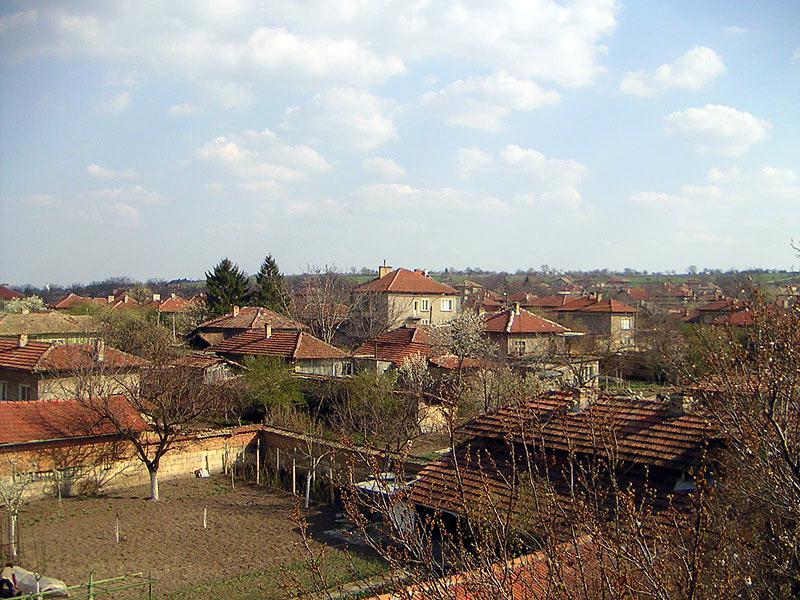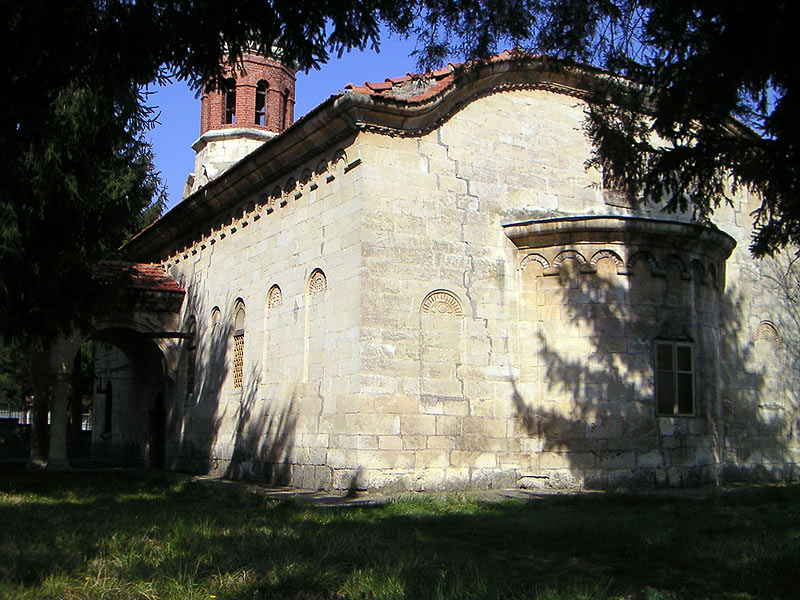Getsovo on:
[Wikipedia]
[Google]
[Amazon]
Getsovo () is a village in northeastern
 The village is located in the valley of the river Beli Lom, 4 kilometres from
The village is located in the valley of the river Beli Lom, 4 kilometres from
 The earliest written records about the village are from the 15th century. There are traces from the
The earliest written records about the village are from the 15th century. There are traces from the


 The population of Getsovo is Orthodox Christians. There is a church in the village – St Demetrius, built in 1876. Since 1967 Kancho Boyadzhiev has been the priest, until his death at the end of 2010. Nowadays Dmitrii Terzi is in this position.
The population of Getsovo is Orthodox Christians. There is a church in the village – St Demetrius, built in 1876. Since 1967 Kancho Boyadzhiev has been the priest, until his death at the end of 2010. Nowadays Dmitrii Terzi is in this position.
Bulgaria
Bulgaria, officially the Republic of Bulgaria, is a country in Southeast Europe. It is situated on the eastern portion of the Balkans directly south of the Danube river and west of the Black Sea. Bulgaria is bordered by Greece and Turkey t ...
, part of Razgrad Municipality, Razgrad Province
Razgrad Province ( (''Oblast Razgrad''), former name Razgrad okrug) is a province in Northeastern Bulgaria, geographically part of the Ludogorie region. It is named after its administrative and industrial centre: the town of Razgrad. As of De ...
.
Geography
 The village is located in the valley of the river Beli Lom, 4 kilometres from
The village is located in the valley of the river Beli Lom, 4 kilometres from Razgrad
Razgrad ( ) is a city in Northeastern Bulgaria in the valley of the Beli Lom river that falls within the historical and geographical region of Ludogorie (Deliorman). It is an administrative center of Razgrad Province.
Etymology
The suffix "gra ...
. The river runs near the northern part of the village. The main road from Rousse
Ruse (also transliterated as Rousse, Russe; ) is the List of cities and towns in Bulgaria, fifth-largest city in Bulgaria. Ruse is in the northeastern part of the country, on the right bank of the Danube, opposite the Romanian city of Giurgiu, ...
to Varna
Varna may refer to:
Places Europe
*Varna, Bulgaria, a city
** Varna Province
** Varna Municipality
** Gulf of Varna
** Lake Varna
**Varna Necropolis
* Vahrn, or Varna, a municipality in Italy
* Varna (Šabac), a village in Serbia
Asia
* Var ...
is parallel to the river being a border between it and the village.
History
 The earliest written records about the village are from the 15th century. There are traces from the
The earliest written records about the village are from the 15th century. There are traces from the Thracian
The Thracians (; ; ) were an Indo-European speaking people who inhabited large parts of Southeast Europe in ancient history.. "The Thracians were an Indo-European people who occupied the area that today is shared between north-eastern Greece, ...
and Slavic
Slavic, Slav or Slavonic may refer to:
Peoples
* Slavic peoples, an ethno-linguistic group living in Europe and Asia
** East Slavic peoples, eastern group of Slavic peoples
** South Slavic peoples, southern group of Slavic peoples
** West Slav ...
settlements. The main clans were settled in the second half of the 18th century, mainly from the neighbour villages Osenets, Dryanovets and Sadina. It is supposed that a part of the Getsovo population consists of inhabitants from Dobrova, a close village that has disappeared some time ago.
Previous names of the village: at the time of the Ottoman rule the village was called Hasanlar. Since 1894 the name was changed – Borisovo (because of the birth of Boris III
Boris III (; 28 August 1943), originally Boris Klemens Robert Maria Pius Ludwig Stanislaus Xaver (Boris Clement Robert Mary Pius Louis Stanislaus Xavier), was the Tsar of the Kingdom of Bulgaria from 1918 until his death in 1943.
The eldest son ...
, Tzar of Bulgaria). The actual name was given after the Communist coup d’etat and it was in honour of the partisan Getso Nedelchev, killed in 1944.
Getsovo was liberated from the Ottoman Empire
The Ottoman Empire (), also called the Turkish Empire, was an empire, imperial realm that controlled much of Southeast Europe, West Asia, and North Africa from the 14th to early 20th centuries; it also controlled parts of southeastern Centr ...
on 27 January 1878, when Russian troops entered the village. Russian soldiers and nurses were buried in the graveyard of the village.
Some inhabitants of Getsovo took part into the wars from the end of 19th century and the beginning of the 20th centuries. Many people were killed: 21 in the First
First most commonly refers to:
* First, the ordinal form of the number 1
First or 1st may also refer to:
Acronyms
* Faint Images of the Radio Sky at Twenty-Centimeters, an astronomical survey carried out by the Very Large Array
* Far Infrared a ...
and Second Balkan War
The Second Balkan War was a conflict that broke out when Kingdom of Bulgaria, Bulgaria, dissatisfied with its share of the spoils of the First Balkan War, attacked its former allies, Kingdom of Serbia, Serbia and Kingdom of Greece, Greece, on 1 ...
s, 1 in the Serbo-Bulgarian War
The Serbo-Bulgarian War or the Serbian–Bulgarian War (, ''Srăbsko-bălgarska voyna'', , ''Srpsko-bugarski rat''), a war between the Kingdom of Serbia and the Principality of Bulgaria, erupted on and lasted until . Despite Bulgaria's statu ...
, 46 in the World War I
World War I or the First World War (28 July 1914 – 11 November 1918), also known as the Great War, was a World war, global conflict between two coalitions: the Allies of World War I, Allies (or Entente) and the Central Powers. Fighting to ...
, 1 in the Spanish Civil War
The Spanish Civil War () was a military conflict fought from 1936 to 1939 between the Republican faction (Spanish Civil War), Republicans and the Nationalist faction (Spanish Civil War), Nationalists. Republicans were loyal to the Left-wing p ...
, 6 in the World War II
World War II or the Second World War (1 September 1939 – 2 September 1945) was a World war, global conflict between two coalitions: the Allies of World War II, Allies and the Axis powers. World War II by country, Nearly all of the wo ...
. There is a soldiers' monument in honour of those who died in the wars. In 1941 German troops went through the village on their way to occupy Greece
Greece, officially the Hellenic Republic, is a country in Southeast Europe. Located on the southern tip of the Balkan peninsula, it shares land borders with Albania to the northwest, North Macedonia and Bulgaria to the north, and Turkey to th ...
. After the invasion of the Soviet Army
The Soviet Ground Forces () was the land warfare service branch of the Soviet Armed Forces from 1946 to 1992. It was preceded by the Red Army.
After the Soviet Union ceased to exist in December 1991, the Ground Forces remained under th ...
in September 1944 captives from the German Army were prisoned in the school building. Some Soviet
The Union of Soviet Socialist Republics. (USSR), commonly known as the Soviet Union, was a List of former transcontinental countries#Since 1700, transcontinental country that spanned much of Eurasia from 1922 until Dissolution of the Soviet ...
soldiers changed their tired horses with horses from the village.
The population of the village consists of Bulgarian ethos (ethnographic group Kapantsi) and a few people from the Roma minority. In the past the east part of the village was inhabited with Turkish, but they left the village after the Liberation. For three decades Getsovo was a district of Razgrad
Razgrad ( ) is a city in Northeastern Bulgaria in the valley of the Beli Lom river that falls within the historical and geographical region of Ludogorie (Deliorman). It is an administrative center of Razgrad Province.
Etymology
The suffix "gra ...
, but since 1991 it became a village again. Electrification started in 1939, in 1967 the village was supplied with water, but there are not public drains yet.
Religion


 The population of Getsovo is Orthodox Christians. There is a church in the village – St Demetrius, built in 1876. Since 1967 Kancho Boyadzhiev has been the priest, until his death at the end of 2010. Nowadays Dmitrii Terzi is in this position.
The population of Getsovo is Orthodox Christians. There is a church in the village – St Demetrius, built in 1876. Since 1967 Kancho Boyadzhiev has been the priest, until his death at the end of 2010. Nowadays Dmitrii Terzi is in this position.
Public institutions
- Ivan Vazov Primary School. It was built in 1933 but it was closed down in 2008. The first school in Getsovo was founded in 1852; - A kindergarten was opened in 1967. The first kindergarten in Getsovo was founded in 1940; -Chitalishte
A ''chitalishte'' (, ) is a traditional Bulgarian public institution and building that fulfills several functions at once, such as a community centre, public library, and a theatre. It is also used as an educational institution, where people o ...
(Community centre) Prosveta with a public library. The first Chitalishte
A ''chitalishte'' (, ) is a traditional Bulgarian public institution and building that fulfills several functions at once, such as a community centre, public library, and a theatre. It is also used as an educational institution, where people o ...
in Getsovo was founded in 1883.
Cultural and nature sights
Folklore ensembles: - Ensemble for Spring Folklore called Kapanska kitka with Art director Olga Dimitrova; - Spring Folklore Troup Chitalishte Prosveta with Art director Ginka Stoyanova; - Folklore dancing school Kapanska magiya with a manager Nedelcho Raychev.Regular events
- Annual traditional village fair on 6-th May; - Monthly Sunday animal market-place (closed).Literature
- History, customs and culture of Getsovo – Kiril Rizov, 1970; - Getsovo village, Razgrad municipality – Nikola Ivanov, 2001; - History of Getsovo village – Penio Rizov, 2008.Other information
A stud with a race course is located in the western part of the village. It was a sport base ofCSKA Sofia
CSKA Sofia () is a Bulgarian professional association football club based in Sofia and currently competing in the country's premier football competition, the First League. ''CSKA'' is an abbreviation for ''Central Sports Club of the Army'' ...
, but now it is temporarily managed for free by a farmer. A former agricultural airport can be seen nearby. A middle-sized car service is located in the eastern part of the village. There are cow, sheep and pig farms to the north, about a kilometre away from the village.
In 2007 Uragan - Getsovo football club was restored after 15-year break.
Cuisine
It is supposed that the hostesses form Getsovo prepare the finest Bulgarian yoghurt, because of the unique climate, animal’s pasture and the method of preparation. {{Razgrad Villages in Razgrad Province